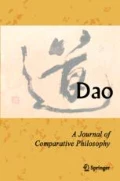References
Analects, trans. James Legge. New York: Dover Publications.
Cang, Xiuliang. 1984.Zhang Xuecheng and his General Meanings of History and Literatue. Beijing: Zhonghua shuju.
Dastur, Françoise. 1998.Heidegger and the Question of Time. Trans. François-Raffoul & David Pettigrew. Atlantic Highlands, NJ: Humanities Press.
Demieville, Paul. 1961. “Chang Hsüeh-ch’eng and His Historiography.” InHistorians of China and Japan. Eds. W.G. Beasley & E.G. Pulleyblank London: Oxford University Press: 167–185.
Dostal, Robert. 1993. “Time and Phenomenology in Husserl and Heidegger.” InThe Cambridge Companion to Heidegger. Ed. Charles B. Guignon. New York: Cambridge University Press: 146–147.
Elman, Benjamin. 1984.From Philosophy to Philology: Intellectual and Social Aspects of Change in Late Imperial China. Cambridge, MA: Harvard University Press.
Frede, Dorothea. 1993. “The Question of Being: Heidegger’s Project.” InThe Cambridge Companion to Heidegger. Ed. Charles B. Guignon. New York: Cambridge University Press: 42–69.
Guignon, Charles. 1993. “Introduction.” InThe Cambridge Companion to Heidegger. Ed. Charles B. Guignon New York: Cambridge University Press: 1–41.
He, Bingsong. 1990.Collected Essays of He Bingsong. Eds. Liu Yinsheng et al. Beijing: Shangwu yinshuguan.
Heidegger, Martin. 1972.On Time and Being. Trans. Joan Stambaugh New York: Harper & Row.
—. 1992.History of the Concept of Time. Trans. Theodore Kisiel. Bloomington: Indiana University Press.
—. 1996.Being and Time. Trans. Joan Stambaugh. Albany: University of New York Press.
—. 2001.Phenomenological Interpretations of Aristotle: Initiation into Phenomenological Research. Trans. Richard Rojcewicz. Bloomington: Indiana University Press.
Higham, John. 1968.History: The Development of Historical Studies in the U.S. Englewood Cliffs, NJ: Prentice Hall.
Hoy, David C. 1978. “History, Historicity, and Historiography in Being and Time.” InHeidegger and Modern Philosophy. Ed. Michael Murray. New Haven: Yale University Press.
Hu, Shi. 1922.Chronicle biography of Zhang Xuecheng. Shanghai: Shangwu yinshuguan.
Iggers, Georg and Konrad von Moltke, eds. 1973.The Theory and Practice of History: Leopold von Ranke. Indianapolis: Irvingston.
Jaeger, Friedrich and Jörn Rüsen. 1992.Geschichte des Historismus. Munich: C. H. Beck.
Kisiel, Theodor. 1993.The Genesis of Heidegger’s Being and Time. Berkeley: University of California Press.
Krieger, Leonard. 1968. “European History in America.” InHistory: The Development of Historical Studies in the U.S. Ed. John Higham. Englewood Cliffs, NJ: Prentice Hall: 255–267.
May, Reihard. 1996.Heidegger’s Hidden Sources: East Asian Influences on His Work. Trans. Graham Parkes. London: Routledge.
Momigliano, Arnaldo. 1966. “Time in Ancient Historiography.”History and the Concept of Time. Middletown, CT: Wesleyan University Press, 1966.
Nivison, David. 1966.The Life and Thought of Chang Hsüeh-ch’eng. Stanford: Stanford University Press.
Parkes, Graham, ed. 1987.Heidegger and Asian Thought. Honolulu: University of Hawaii Press.
—. 1996. “Translator’s Preface.” InHeidegger’s Hidden Sources: East Asian Influences on His Work. London: Routledge.
Risser, James, ed. 1999.Heidegger toward the Turn: Essays on the Work of the 1930s. Albany: SUNY Press..
Russell, Bertrand. 1972.A History of Western Philosophy. New York: Simon & Schuster.
Wu, Kuang-ming. 1995. “Spatiotemporal Interpretation in Chinese Thinking.” InTime and Space in Chinese Culture. Eds. Chun-chieh Huang & Erik Zürcher. Leiden: E.J. Brill.
Yu, Ying-shih. 1980.On Dai Zhen and Zhang Xuecheng. Taipei: Huashi chubanshe.
Zhang, Xuecheng. 1993.General Meanings of History and Literature: New Edition. Ed. Xiuliang Cang. Shanghai: Shanghai guji chubanshe.
Zhu, Jingwu. 1996.Zhang Xuecheng’s Philosophy of History and Culture. Taipei: Wenjin chubanshe.
Author information
Authors and Affiliations
Corresponding author
Rights and permissions
About this article
Cite this article
Wang, E.Q. Time, history, and Dao: Zhang Xuecheng, and Martin Heidegger. Dao 1, 251–276 (2002). https://doi.org/10.1007/BF02857098
Issue Date:
DOI: https://doi.org/10.1007/BF02857098

